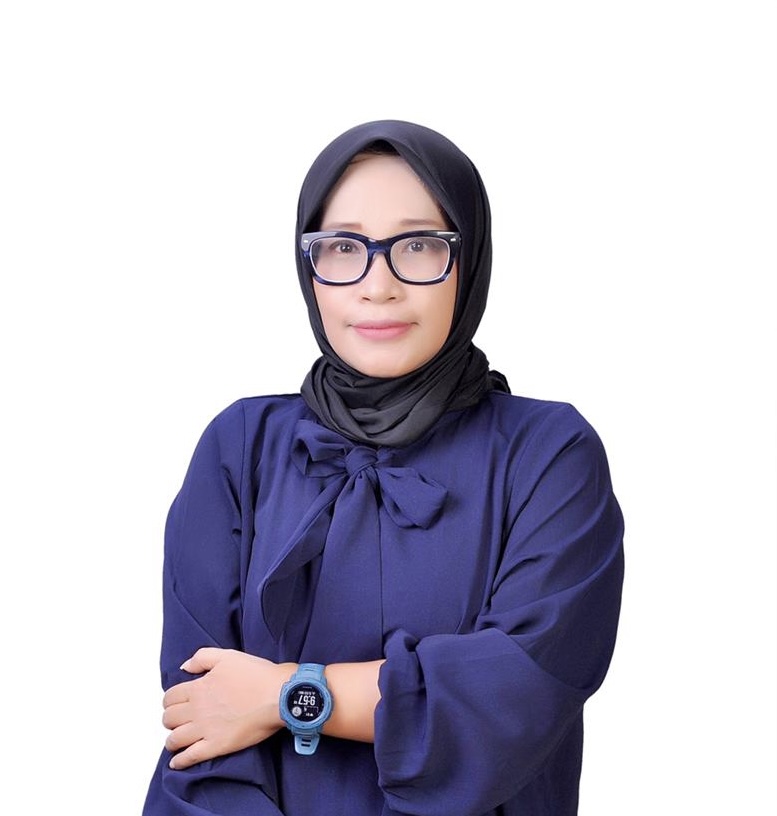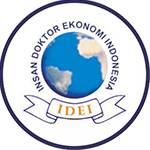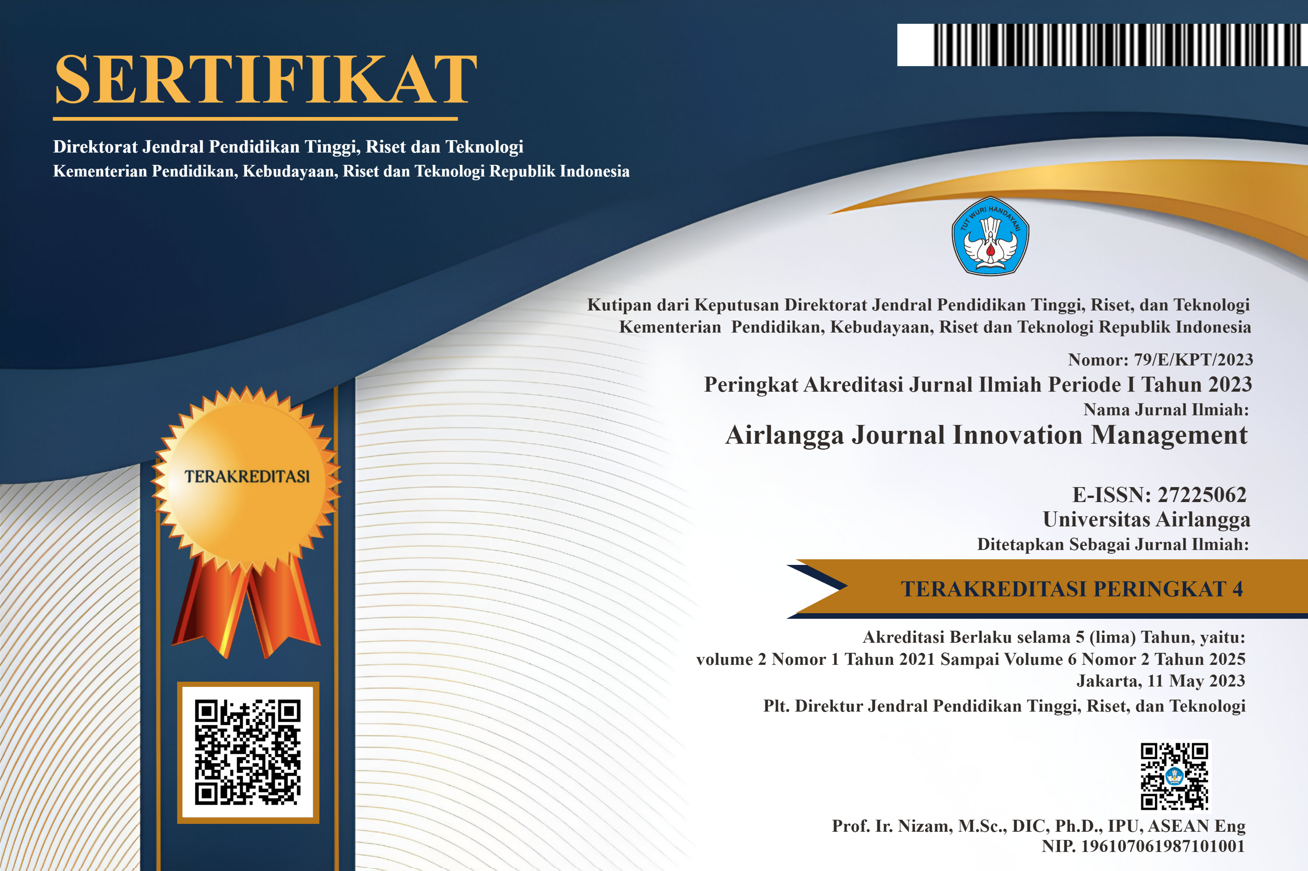Impact of Islamic Financial Literacy, Money Attitude, and Social Environment on Young Muslim Couples' Financial Planning
Downloads
Disciplined financial planning can create a more durable and financially stable marriage. However, many people still depend on fate, leading to financial planning being overlooked in daily life. Economic factors remain the second most common cause of divorce in Surabaya. Indonesia’s Sharia financial literacy index is only 8.93%, and only 6.3% of the population prepares for long-term financial goals. This study has the purpose of observing the modification theory of planned behavior with the variable Islamic financial literacy, attitude towards money, and social environment on family financial planning among young Muslim couples, especially in Surabaya. This research uses a quantitative approach used multiple linear regression analysis, utilizing IBM SPSS version 27 as the analytical tool. The subjects of this research are young Muslim couples in Surabaya, as younger generations often lack sufficient financial knowledge and tend to make poor financial decisions. The total sample consists of 75 respondents. The results show that Islamic financial literacy and social environment variables positively and significantly affect family financial planning. Meanwhile, the attitude towards money variable also shows an influence but is not statistically significant. These findings highlight the importance of improving Islamic financial literacy and leveraging the social environment to enhance family financial planning outcomes.
Ajzen, I. (1991). The Theory of Planned Behavior. Organizational Behavior and Human Decision Processes, 50, 179–211. https://doi.org/10.4135/9781446249215.n22
Ajzen, I. (2005). Attitudes, Personality and Behavior. Open University press.
Amrin. (2016). Data Mining Dengan Regresi Linier Berganda Untuk Peramalan Tingkat Inflasi. Jurnal Techno Nusa Mandiri, XIII(1), 74–79.
Bonang, D. (2019). Pengaruh Literasi Keuangan terhadap Perencanaan Keuangan Keluarga di Kota Mataram. J-EBIS (Jurnal Ekonomi Dan Bisnis Islam, 4(2), 155–165.
Boon, T. H., Yee, H. S., & Ting, H. W. (2011). Financial Literacy and Personal Financial Planning in Klang Valley, Malaysia. International Journal of Economics and Management, 5(1), 149–168.
Dennis, T., & Sobari, N. (2022). Conspicuous consumption on gen Z in Indonesia. Brawijaya International Conference on Economics, Business and Finance 2021 (BICEBF 2021), 136–142.
Durvasula, S., & Lysonski, S. (2007). Money Attitudes, Materialism, and Achievement Vanity: An Investigation of Young Chinese Consumers’ Perceptions. International Marketing Conference on Marketing & Society, 497--499, 97–111. https://doi.org/10.32534/jpk.v9i2.2332
Fauziah, N., Mulyati, H., & Ermawati, W. J. (2020). the Measurement of Efficiency and Factors That Affect Indonesia Sharia Insurance Efficiency. Jurnal Aplikasi Manajemen, 18(2), 219–231. https://doi.org/10.21776/ub.jam.2020.018.02.02
Fauziana, H., Wardhana, A. K., & Rusgianto, S. (2022). The Effect of Education, Income, Unemployment, and Poverty toward the Gini Ratio in Member of OIC Countries. Daengku: Journal of Humanities and Social Sciences Innovation, 2(2), 181–191.
Febriyanti, A. R., Ratnasari, R. T., & Wardhana, A. K. (2022). The Effect of Economic Growth, Agricultural Land, and Trade Openness Moderated By Population Density on Deforestation in OIC Countries. Quantitative Economics and Management Studies, 3(2).
Ghifara, A. S., Iman, A. N., Wardhana, A. K., Rusgianto, S., & Ratnasari, R. T. (2022). The Effect of Economic Growth, Government Spending, and Human Development Index toward Inequality of Income Distribution in the Metropolitan Cities in Indonesia. Daengku: Journal of Humanities and Social Sciences Innovation, 2(4), 529–536.
Hari Kristianto, A. (2020). SUSTAINABLE DEVELOPMENT GOALS (SDGs) DALAM KONSEP GREEN ECONOMY UNTUK PERTUMBUHAN EKONOMI BERKUALITAS BERBASIS EKOLOGI. Business, Economics and Entrepreneurship, 2(1), 27–38. https://doi.org/10.46229/b.e.e..v2i1.134
Ichak Ajzen. (1991). The Theory of Planned Behavior. Organizational Behavior and Human Decision Processes.
Iman, A. N., Wardhana, A. K., Rusgianto, S., & Ratnasari, R. T. (2022). Venture vs Investment, Which Type of Financing was more Demanded by Agriculture, Forestry, and Aquaculture Sector? Daengku: Journal of Humanities and Social Sciences Innovation, 2(5), 587–595.
Koe, J. H. N., & Yeoh, K. K. (2021). Factors Influencing Financial Planning for Marriage amongst Young Malaysian Couples. International Journal of Business and Society, 22(1), 33–54. https://doi.org/10.33736/IJBS.3161.2021
Loestefani, V., Poan, R., Suwitorahardjo, B., & Wardhana, A. K. (2022). Service Quality and Product Quality as An Influence on Customer Loyalty at Naturalis Koffie. FIRM Journal of Management Studies, 7(2), 211–236.
Matondang, A. (2014). Faktor-faktor yang Mengakibatkan Perceraian dalam Perkawinan. Jurnal Ilmu Pemerintahan Dan Sosial Politik, 2(2), 141–150.
Maulida, A. Z., Risdiana, R., & Purnomo, A. (2023). Performance of Indonesia’s Sharia Capital Market for the 2022 Period. Journal of Islamic Economics and Philanthropy, 5(4), 97–113. https://doi.org/10.21111/jiep.v6i2.9369
Mizanulhaq, M. (2024). Pengaruh Literasi Keuangan Syariah dan Gaya Hidup Konsumtif Terhadap Minat Penggunaan Paylater Pada Gen-Z: Studi Kasus Pada Mahasiswa Universitas Islam Indonesia. Universitas Islam Indonesia.
Muhaimin, H., Herachwati, N., Hadi, C., Wihara, D. S., & Wardhana, A. K. (2023). Entrepreneurship Leadership: Fostering An Entrepreneurial Spirit In Students During Pandemic Covid-19 (Case Study In Tebuireng Boarding School East Java). Journal of Namibian Studies: History Politics Culture, 33, 5597–5610.
OJK. (2021). Strategi Nasional Literasi Keuangan Indonesia (SNLKI) 2021 - 2025.
Otoritas Jasa Keuangan (OJK). (2022). Statistik Perbankan Syariah (SPS).
Pamikatsih, T. R., Lusia, A., Rahayu, A. S., Maisara, P., & Farida, A. (2022). The influencing factors for financial behavior of gen Z. International Conference of Business and Social Sciences, 440–449.
Qosim, N., Ratnasari, R. T., Wardhana, A. K., Fauziana, H., & Barkah, T. T. (2023). Eight Years of Research Related to the Green Sukuk in the Global Stock Exchange Market to Support the Implementation of SDG: A Bibliometric Review. Journal of Islamic Economic and Business Research, 3(2), 161–180.
Rahman, I., Ratnasari, R. T., & Wardhana, A. K. (2022). Effect of Certificate of Bank Indonesia Sharia and Indonesian Bank Seven Days Repository Rate to Inflation Ratio in Indonesia During Covid-19 Pandemic. Economic Education and Entrepreneurship Journal, 5(1), 157–174.
Rahmatya, M. D., & Wicaksono, M. F. (2018). Model of receipt and distribution of zakat funds information system (A. A.G., N. A.B.D., W. L., & K. P.S. (eds.); Vol. 407, Issue 1). Institute of Physics Publishing. https://doi.org/10.1088/1757-899X/407/1/012071
Ryandono, M. N. H., Kusuma, A., Maryani, A., & Wijayanti, I. (2022). Factors influence online donation during COVID-19 pandemic. Al-Uqud: Journal of Islamic Economics, 6(1), 66–83.
Ryandono, M. N. H., Permatasari, S. A., & Wijayanti, I. (2019). Business behavior in an islamic perspective: Case study of muslim woman entrepreneurs in Ikatan Wanita Pengusaha Indonesia (IWAPI). 12th International Conference on Business and Management Research (ICBMR 2018), 154–159.
Ryandono, M. N. H., Wijayanti, I., & Kusuma, K. A. (2020). Determinants of Investment In Islamic Crowdfunding. Muqtasid: Jurnal Ekonomi Dan Perbankan Syariah, 11(1), 70–87.
Santoso, T. B., & Kusuma, A. (2023). The Development of the Usage of Blockchain for Waqf and Zakat Globally: A Bibliometric Study. International Journal of Mechanical Computational and Manufacturing Research, 13(3), 83–91.
Saputri, F. A., & Iramani. (2019). Pengaruh Literasi Keuangan, Nilai Pribadi dan Sikap Personal terhadap Perencanaan Keuangan Keluarga di Surabaya. Journal of Business and Banking, 9(1), 123–141.
Savelli, E., & Murmura, F. (2023). The intention to consume healthy food among older Gen-Z: Examining antecedents and mediators. Food Quality and Preference, 105, 104788.
Setyowati, A., Harmadi, H., & Sunarjanto, S. (2018). Islamic Financial Literacy and Personal Financial Planning: A Socio-Demographic Study. Jurnal Keuangan Dan Perbankan, 22(1), 63–72. https://doi.org/10.26905/jkdp.v22i1.1625
Sobaya, S., Hidayanto, M. F., & Safitri, J. (2016). Pengaruh Literasi Keuangan dan Lingkungan Sosial terhadap Perencanaan Keuangan Pegawai di Universitas Islam Indonesia Yogyakarta. Madania, 20(1), 115–128.
Syafiqah, A. D., & Diana, D. (2024). The Influence of Factors on Students’ Financial Management: SEM Approach. Airlangga Journal of Innovation Management, 5(2), 231–246. https://doi.org/10.20473/ajim.v5i2.57746
Tamanni, L., & Mukhlisin, M. (2018). Sakinah Finance: Solusi Mudah Mengatur Keluangan Keluarga Islami. Tinta Medina.
Taneja, R. M. (2012). Money Attitude -- an Abridgement. Journal of Arts, Science & Commerce, 3(3), 94–98.
Topa, G., Hernández-Solís, M., & Zappalà, S. (2018). Financial management behavior among young adults: The role of need for cognitive closure in a three-wave moderated mediation model. Frontiers in Psychology, 9, 415936.
Vika Annisa Qurrata, Ermita Yusida, Nor Ermawati Hussain, Santi Merlinda, Vidya Purnamasari, & Linda Seprillina. (2021). Effectiveness of cash waqf management in improving community welfare: Challenges and opportunities. Review of Integrative Business & Economics Research, 10(1), 342–359.
Wahyono, T. (2014). Analisis Statistik Mudah dengan SPSS 20. Elex Media Komputindo.
Wardhana, A. K. (2022). JANJI (WA’AD) SEBAGAI JARING PENGAMAN PADA TRANSAKSI KEUANGAN DAN BISNIS SYARIAH. Jurnal Keislaman, 5(1), 124–132. https://doi.org/https://doi.org/10.54298/jk.v5i1.3412
Wardhana, A. K., & Ratnasari, R. T. (2022). Impact of Agricultural Land and the Output of Agricultural Products Moderated with Internet Users toward the Total export of Agricultural Product in Three Islamic South East Asian Countries. Iqtishodia: Jurnal Ekonomi Syariah, 7(2), 11–20.
Wijayanti, I., Ryandono, M. N. H., & Petra, D. H. S. P. H. (2021). Financial Inclusion through Zakat Institution: Case Study in Indonesia and Brunei Darussalam. International Journal of Islamic Business and Economics (IJIBEC), 5(2), 128–140.
Wong, J. (2010). An Analysis of Money Attitudes : Their Relationships & Effects On Personal Needs, Social Identity and Emotions. Journal of Leadership, Accountability and Ethics, 8(1), 1–8.
Wulandari, F. A., & Sutjiati, R. (2014). Pengaruh Tingkat Kesadaran Masyarakat dalam Perencanaan Keuangan Keluarga terhadap Kesejahteraan (Studi pada Warga Komplek BCP, Jatinangor). Jurnal Siasat Bisnis, 18(1), 21–31.
Wulandari, P., Prijadi, R., & Desiana, P. M. (2021). Price rationing in Islamic Cooperatives Institutions (challenges and solutions to poverty reduction in Indonesia) (H. H. (ed.); Vol. 716, Issue 1). IOP Publishing Ltd. https://doi.org/10.1088/1755-1315/716/1/012059
Yudha, A. T. R. C., Huda, N., Maksum, M., Sherawali, S., & Wijayanti, I. (2024). The Moderating Effect of Religiosity on Fashion Uniqueness and Consciousness in Halal Fashion Purchase. Indonesian Journal of Halal Research, 6(2), 71–84.
Zulaikha, S., Hendratmi, A., Sridadi, A. R., Basit, A., Iman, A. N., Wardhana, A. K., Ghifara, A. S., Pratiwi, A. C., Febriyanti, A. R., & Nugroho, A. D. (n.d.). FILSAFAT EKONOMI ISLAM Menjawab Tantangan Peradaban. Zifatama Jawara.
Copyright (c) 2024 Airlangga Journal of Innovation Management

This work is licensed under a Creative Commons Attribution-NonCommercial-ShareAlike 4.0 International License.
- The journal allows authors to hold copyright without restrictions and retain publication rights without restrictions. The author retains the copyright and grants the first publication rights to the journal, with his work simultaneously licensed under the Creative Commons Attribution-NonCommercial-ShareAlike 4.0 International License (CC BY-NC-SA). This license allows others to share the work with acknowledgment of authorship and initial publication in this journal, provided that the work is not used for commercial purposes and that any derivative works must use the same license.
- Authors may enter into additional contractual agreements for non-exclusive distribution of the journal publication version (e.g., uploading it to an institutional repository or publishing it in book form), while still including acknowledgment of the initial publication in this journal.
- Authors are allowed and encouraged to upload their work online (e.g., in an institutional repository or personal website) before and during the submission process. This can support productive scientific exchanges as well as increase citations to published works.

AJIM by UNAIR is licensed under a Creative Commons Attribution-NonCommercial-ShareAlike 4.0 International License.





















